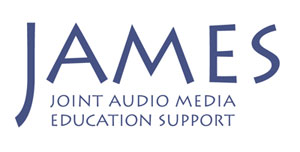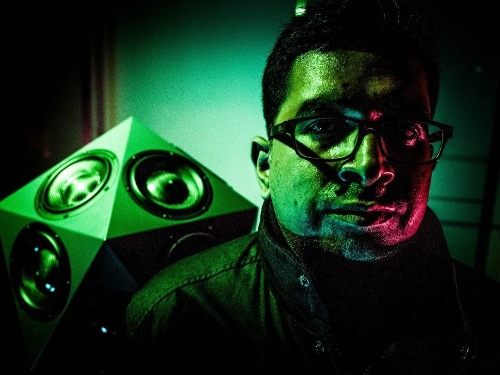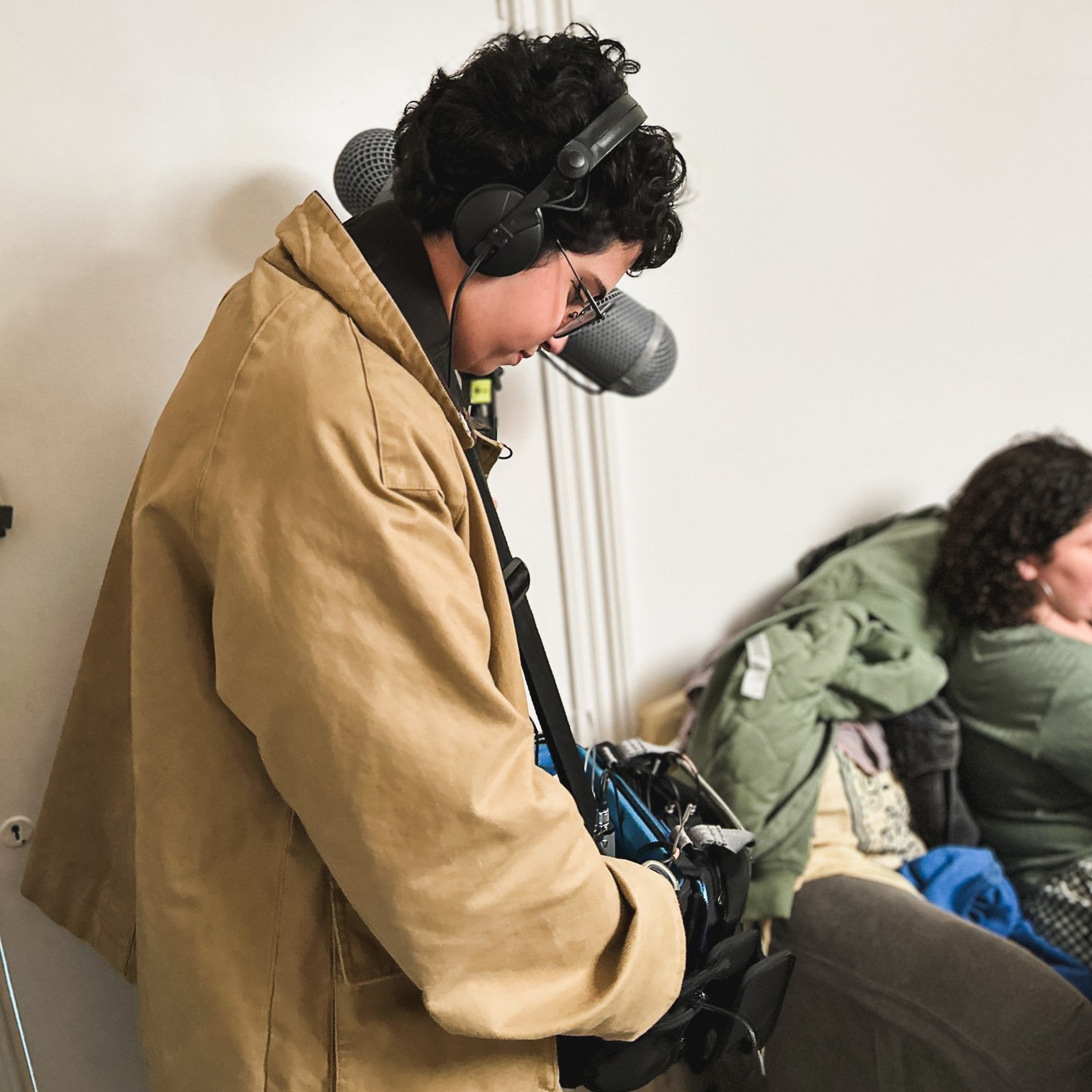Music and Sound Production, BA Hons
Open your ears to a range of musical worlds, from music production to sound design in film, TV, music and games. Creativity is at the heart of this degree course.
Informed by industry partners, this course is built and taught by leading experts from the University’s Centre for Sound-Image. While each module offers structured guidance, the course is intentionally designed to give you space to shape your own creative direction, encouraging you to explore and develop your interests both within and beyond taught sessions.
Practical work forms a core part of your learning, helping you refine your creative voice and strengthen your technical skills in sound and music production. This foundation supports a wide range of professional pathways across the music and sound industries.
Graduates from this course go on to work as composers, sound artists, music producers, sound designers for film, games and television, community music practitioners, facilitators and more.
Throughout your degree, you will have access to specialist facilities including sound studios, film and TV studios, theatre spaces, editing labs and workshops, and you can read more about these on the page below.
UCAS points
112 (full requirements below)
Course/institution codes
W370 G BA/MSP
Location
Duration
3 years full-time
Start month
September
Home* /international fees 2026/27
£9,790 /£17,975
What you should know about this course
* Home fees
The government regulated undergraduate home tuition fee rate for 2026-27 has been confirmed as £9,790 per year.
What you will study
About the course team
Meet the minds shaping the future of sound and image: a team of trailblazing academics, composers, sound artists, and industry professionals all active practitioners in the field of music, embedding their world-class research and creative practice directly into their teaching. Discover their work at the Centre for Sound and Image.
Come and meet us
We are offering virtual events so you can still experience how Greenwich could be the right university for you.
Next Open Days
Got a question?
To find out more about our Open Days and Campus Tours or if you need any assistance, please email opendays@gre.ac.uk.
Entry requirements
Qualifications
- 112 UCAS Tariff points. We accept A Levels, T Levels, BTECs, Access to HE and all other qualifications with UCAS Tariff points.
Contextual Admissions
- We make Contextual offers to this programme. Applicants that meet specific eligibility criteria will be made a contextual offer with a reduced tariff of up to 16 UCAS Tariff points. Other entry requirements such as GCSEs, Interview, etc., will still need to be met. For further information, please see our Contextual Admissions Policy.
We also accept applications if you wish to transfer from another institution, and have already studied 1 or 2 years of a relevant course at level 4 or 5 and wish to continue your education at the University of Greenwich.
For more information, use our contact form or call us on 020 8331 9000.
You can also read our admissions policy.
Available to overseas students?
Yes
Can I use Prior Learning?
For entry: applicants with professional qualifications and/or four years of full-time work experience will be considered on an individual basis.
For exemption: If you hold qualifications or courses from another higher education institution, these may exempt you from courses of this degree.
How you will learn
Teaching
Learning takes place through a combination of timetabled learning and independent study.
You can view more information about how each module is taught within our 'What you will study' section.
Seminars and workshops enable you to discuss and develop your understanding of topics covered in lectures in smaller groups. You will also be able to meet your personal tutor. Timetabled learning may fall between 9am and 9pm depending on your courses and tutorials.
Class sizes
Class sizes are tailored to the activity. Workshops typically accommodate around 25 students, while lectures may be larger. For assessments, projects, and performances, you’ll work in smaller groups to maximise learning and collaboration.
Independent learning
Students are required to undertake independent learning throughout the degree. Outside of timetabled sessions, you are expected to dedicate time for self-study and group work. Tasks include set reading, practical and theoretical research, and working in small groups on assessments, performances, and presentations.
You will have opportunities to work in our sound lab, and book our sound studios for composition, sound editing, recording, mixing, and mastering, visit the library for research, and attend concerts and events such as the Loudspeaker Orchestra Concert Series and the annual world leading international Sound/Image Festival. This combination of independent practice, collaborative projects, and engagement with live performance and the wider music and sound community helps you develop the creativity, technical skills, and professional experience needed for a successful career in the field.
Overall workload
Students will study four 30-credit modules each year at Levels 4, 5, and 6. Each module runs for one term and combines independent study with collaborative creative projects. Full-time students should expect a workload comparable to a full-time job, including studio practice, late-night sessions, and intensive project work. Each 30-credit module requires around 300 hours of study, including staff contact time.
Assessment
You can view how each module is assessed within our 'What you will study' section.
Each course has formal assessments which count towards your grade. Some courses may also include 'practice' assignments, which help you monitor progress and do not count towards your final grade.
Feedback summary
We aim to give feedback on assignments within 15 working days.
Dates and timetables
The academic year runs from September to June.
Full teaching timetables are not usually available until term has started. For any queries, please use our contact form.
Official statistics on Discover Uni
Full time
Fees and funding
Tuition fees
| Cohort | Full time | Part time | Distance learning |
|---|---|---|---|
| Home* | £9,790 | N/A | N/A |
| International | £17,975 | N/A | N/A |
University is a great investment in your future. English-domiciled graduate annual salaries were £10,500 more than non-graduates in 2023 - and the UK Government projects that 88% of new jobs by 2035 will be at graduate level.
(Source: DfE Graduate labour market statistics: 2023/DfE Labour market and skills projections: 2020 to 2035).
* Home fees
The government regulated undergraduate home tuition fee rate for 2026-27 has been confirmed as £9,790 per year.
Other costs
Equipment: Although they are not essential to study the course, we do recommend the purchase of a pair of professional studio headphones and a portable external hard drive which you can use to store backups and transfer your work between workstations. It is worth investing seriously in these items as both will be invaluable to you in years to come, through your time at the university and beyond into professional practice. Students must wait until they join the course before considering purchasing either item as course staff will be able to make recommendations on products.
Scholarships and bursaries
We offer a wide range of financial help including scholarships and bursaries.
The Greenwich Bursary
This bursary is worth £700 for new undergraduate students with a low household income, entering Year 0 or 1 who meet the eligibility criteria.
EU Bursary
Following the UK's departure from the European Union, we are supporting new EU students by offering a substantial fee-reduction for studying.
Financial support
We want your time at university to be enjoyable, rewarding, and free of unnecessary stress, so planning your finances before you come to university can help to reduce financial concerns. We can offer advice on living costs and budgeting, as well as on awards, allowances and loans.
Careers and placements
Will I have a work placement?
In the third year of study, students will undertake the ‘Music and Media Industry Placement’ 30-credit module. This module allows students to undertake work-based learning in a professional setting related to their course of study. Students will complete a work placement (of 100 hours), alongside regular tutorials and lectures. Many placements are found through our network of industry contacts, and students are supported in securing these.
How long is my placement?
The ‘Music and Media Industry Placement’ module requires students to complete a work placement of 100 hours.
What are the financial arrangements?
Work placement modules are normally unpaid.
What sort of careers do graduates pursue?
This course will equip students with the skills and abilities required to enter various creative media industries, including music, film, theatre and games. Possible roles for graduates might include: studio engineering; radio and television work; professional performance; teaching; video and film sound editing; live sound engineering; record production; film and video music composition; sound effects; sound production for exhibitions and events.
Are internships available?
Students are encouraged to take up Summer internships during the Summer holidays, though it is up to the student to find them. Support is available to students from the Employability and Careers Service when applying for placements and internships.
Do you provide employability services?
Employability activities take place all the time at Greenwich and students are encouraged to take part in as many opportunities as possible. The central Employability and Careers Service provides support for students preparing to apply for placements and graduate roles, such as CV clinics, mock interviews and employability skills workshops. In addition, your School has a dedicated Employability Officer who will be organising work-related activities throughout the year which will help you to build you industry knowledge and networks.
Accommodation
Greenwich
Living in halls of residence is a great way to make new friends and get into the social side of university life. With four great locations, all minutes away from the campus and the centre of historic Greenwich , you will be at the heart of one of the most beautiful university settings in the UK.
Rooms start at £146.30/wk and include Wi-Fi, utility bills, access to our on-campus gym and 24-hour security - and just a 10-minute train journey to central London. Students based at our Greenwich campus can also choose to live the Student Village at Avery Hill, which is only a short ride on our free shuttle bus.
Support and advice
Academic skills and study support
We want you to make the most of your time with us. You can access study skills support through your tutor, our subject librarians, and our online academic skills centre.
Where appropriate, we provide support in academic English and mathematics. If you need to use particular IT packages for a specific module, we provide training for this.
Support from the department
As a student in the School, you will be a member of a wider creative community. Each year we run a graduate show where our final year students can showcase their best work.
Not quite what you were looking for?
We've got plenty of other courses for you to choose from. Browse our undergraduate courses or check our related courses below.....
Film, media and sound at the University of Greenwich
Develop your skills and knowledge, shape your creative future, in great facilities appropriate to your course - purpose-built film, TV and sound studios, edit suites, and more!
Visit our film, media and sound degrees page.
Michael Kelpie: Producer of ITV's The Chase
Our Media and Communications graduate has forged a hugely successful career at UK production companies and broadcasters. His achievements include a BAFTA for ITV game show, The Chase.
Film, media and sound degrees
Mode of study
Select from the dropdown below.
| Course level | |
| UCAS code | |
| Duration | |
| Location |












